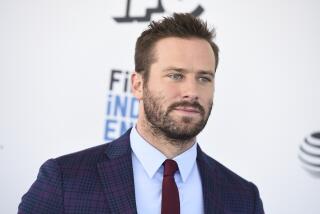Lance Armstrong tells Oprah and the world: He cheated for years
There were no tears or emotional pleas for forgiveness.
Instead, an oddly calm — and occasionally smiling — Lance Armstrong ducked few questions before a national television audience on Thursday night, admitting that he used performance-enhancing drugs throughout his storied cycling career.
His confession ended years of often angry denials.
“I view this situation as one big lie that I repeated a lot of times,” he said, explaining that he used a litany of banned substances while winning seven Tour de France races.
“I viewed it as very simple,” he said. “My cocktail, so to speak, was EPO — but not a lot — transfusions and testosterone.” EPO is a banned blood booster.
Armstrong discussed his systematic doping in a taped interview with Oprah Winfrey, the first 90 minutes of which were broadcast on the talk show host’s cable network. The second half is scheduled to air Friday night.
Winfrey proved to be a direct and authoritative interviewer, leading her guest immediately through a series of yes-or-no questions that established his wrongdoing, then asking for more detailed answers.
As for Armstrong, the debate has only just begun on his performance.
“He’s a liar, and it never stops,” said Kathy LeMond, whose husband, Greg, won three Tour titles and later questioned Armstrong’s success. “I don’t think he’s sorry.”
Travis Tygart, chief executive of the U.S. Anti-Doping Agency, was only slightly more impressed.
“His admission that he doped throughout his career is a small step in the right direction,” Tygart said in a statement. “But if he is sincere in his desire to correct his past mistakes, he will testify under oath about the full extent of his doping activities.”
In October, USADA issued a damning report of more than 1,000 pages that included depositions from 11 of Armstrong’s fellow cyclists. Officials subsequently stripped Armstrong of his Tour titles and banned him from athletic competition for life.
This week the International Olympic Committee asked him to return a bronze medal won at the 2000 Summer Olympics.
The USADA report asserted that Armstrong bullied teammates into doping while overseeing “the most sophisticated, professionalized and successful doping program that sport has ever seen.”
The cyclist took exception to that characterization on Thursday, insisting he never pressured anyone to cheat. He referred to East Germany’s systematic doping of athletes through the 1980s in calling his behavior “very conservative.”
Armstrong also denied bribing the international cycling federation to overlook positive tests. He described a system of out-of-competition doping that left his blood clean enough to pass testing at races.
He also evaded questions about his association with Michele Ferrari, a banned doctor who was suspected of distributing performance-enhancing drugs.
Armstrong said his doping regimen grew more intense after a battle with cancer in the mid-1990s. He said: “I took that attitude, the ruthless, relentless, win-at-all-costs attitude, into cycling.”
With drugs rampant in the world of elite cycling, cheating became routine.
“That was like saying we have to have air in our tires or we have to have water in our bottles,” he said. “That was, in my view, part of the job.”
Winfrey asked him if, at the time, doping felt wrong or if he felt bad about cheating. Armstrong answered “No” to both questions, saying that mind-set now seemed “scary” to him.
As rumors of his doping became more prevalent, Armstrong lashed out at his accusers, both in the media and through lawsuits.
He gave a short laugh in recalling, “Yeah, yeah, I was a bully. ... I was a bully in the sense that I tried to control the narrative … say that’s a lie, they’re liars.”
The matter-of-fact way in which Armstrong described his past should not have been surprising to viewers, said Scott Allison, a psychology professor at the University of Richmond who has studied fallen heroes in American society.
“It kind of reminded me of Tiger Woods coming clean,” Allison said. “For people like Tiger Woods and Lance Armstrong, it’s so foreign to admit wrongdoing that they are out of their element. ... It can come across as robotic.”
Armstrong received some support from the cancer-fighting Livestrong Foundation, which he founded but has since been forced to leave.
Though officials noted that he lied about doping, they added: “Even in the wake of our disappointment, we also express our gratitude to Lance as a survivor for the drive, devotion and spirit he brought to serving cancer patients.”
With half of the interview left to be seen, Armstrong called himself “deeply flawed” but seemed uncertain about any final judgment.
“Jerk and humanitarian,” he said. “I’d say I was both, and we saw both, and now we’re seeing certainly more of the jerk part.”
twitter.com/LATimesWharton
twitter.com/latimespugmire
More to Read
Go beyond the scoreboard
Get the latest on L.A.'s teams in the daily Sports Report newsletter.
You may occasionally receive promotional content from the Los Angeles Times.








